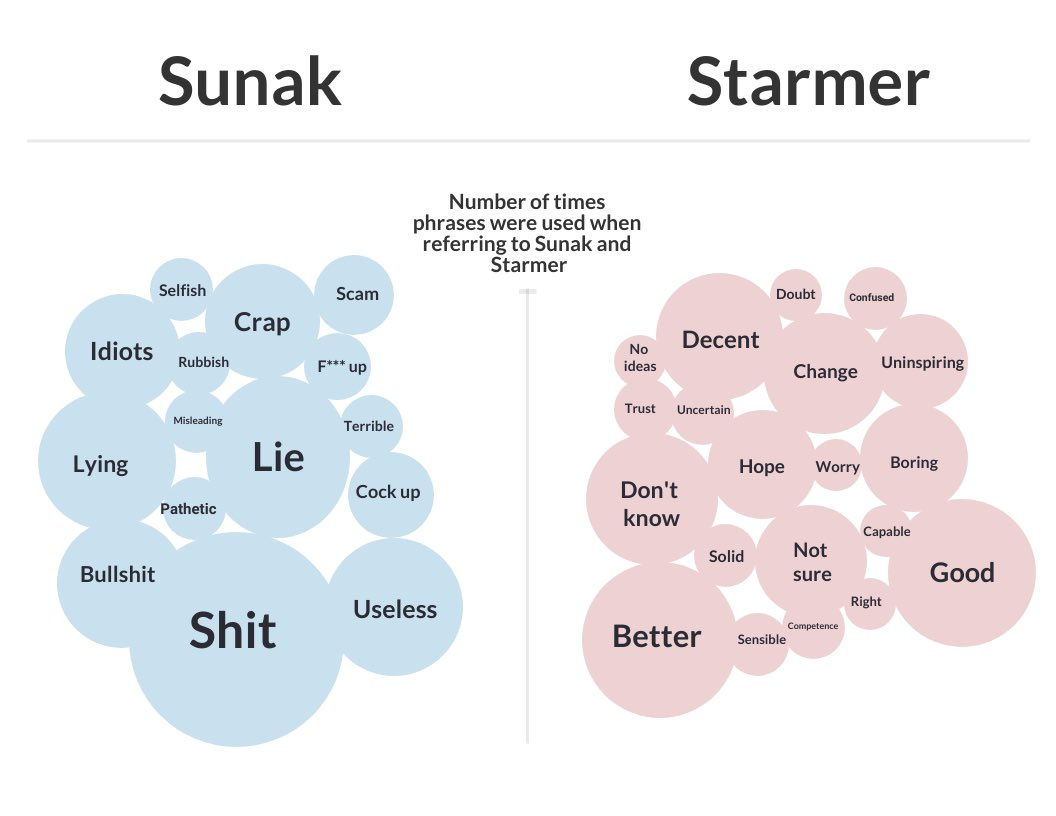Factionalism is self harm
I don't care if the faction I identify with more is up or down. In fighting each other - especially now, we all lose in the end.
Yesterday was NHS Day for Labour. Did you notice? I’m a political obsessive and I can’t say I did. It wasn’t what Labour activists were talking to each other about. It wasn’t what the media were talking about.
Instead, they have been talking about the treatment of Diane Abbott at what might be the end of her political career. It seems that there had been an attempt to ensure that career ended with the dignity that this trailblazing black woman deserved. That attempt was blown up by it being briefed - one-sidedly - to the Times. There is a lot of he said/she said back and forth, but whatever the case, there is no dignity involved for anyone.
I don’t think that this row about expulsions is going to make a huge difference to the election result. Yes, the public has been shown a party in disarray but that’s also true of the Tories of whom they are pig-sick. Look, for example, at this word cloud from Mumsnet users comparing Starmer and Sunak:
Where there will be a difference will be on the morale of many Labour activists. Not just those who belong to the faction that has been on the sharp end of the deselections, but those of us who don’t but feel that having a better internal process is important. This is not a story about Diane or any of the others in the crosshairs. It’s a story about Labour.
(As an aside, I would also say that there is a vast difference between late retirement seats and blocking sitting Labour candidates to impose candidates you prefer. In any election, there were always going to be seats that came up at the last minute, in a snap election more so. Given that, the usual processes being curtailed for selections is not unusual, and the list of candidates who have already been - or who are rumoured to be - selected includes some great people who will make fantastic MPs. We should not conflate these late selections with the issue of late deslections.)
It is worth remembering that whoever is in charge of the Labour Party they and their team bend and break the rules in ways that are egregious and benefit whichever faction backs them. This is not a defect of the right or left of the party but of the way the party is set up and has long learned to behave. It is a defect of power and how it changes you. It is a defect we should deal with but never do.
In the same way that parties elected under first past the post have little impetus to change the voting system, those who get their hands on the levers of power inside the party have little incentive to change the process that got them there. I believe they are wrong, short-termist and short-sighted, but I do understand that compulsion in the moment. Trying to make sure that your politics outlast you is a strong motivational driver. If you have a tool to make that happen, however ugly, the temptation is to use it. But it also leaves that tool available to those who will inevitably beat you as the wheel turns. And so it goes on.
And it does set a narrative.
That narrative is not the one the idiot spinners who keep briefing these issues to the Times think it is. This does not make Starmer look stronger. It makes Labour look messier just as we were presenting as a disciplined and united party. If we’re the anti-chaos party - one of the strongest lines Labour are running with during this election for obvious reasons after the last five years - then why are we not only behaving so chaotically but also telegraphing that chaos to the press? Not clever boys.
So while I said earlier that this won’t make a huge difference to the result of the election, it will weaken the campaign.
I used to be the co-chair of a wannabe Labour faction (though the fact that one of our biggest internal arguments was about whether or not we were a faction tells you everything you need to know about Open Labour).
It might be a result of how appallingly I was treated during that time (not just the disgusting end when I was hounded out due to my own views on the primacy of sex, but throughout my attempt to shape them into a safe, effective and coherent organisation - resisted and undermined at every turn) that has lead to my far greater aversion to factionalism.
Seeing factionalism within a faction from the coalface was obviously going to colour my perceptions. So I mention this so my readers can understand my own priors and read my thoughts on the corrosive effects of factionalism. Understanding this and - if they want to - taking what I say with a pinch of salt, is important to inform readers.
One of my favourite moments of the 2017 election was going out in Ilford North on election day and seeing literally hundreds of people in Momentum and Corbyn T shirts working their hearts out to get Wes Streeting elected. Streeting is about as far from a Corbynite as it’s possible to be. But they knew that getting Labour candidates was important for their politics whoever they were and so they poured themselves into their nearest marginal despite whatever misgivings they may have had about their candidate. This is the better side of factionalism. The organisation of internal groups of people to campaign for the party overall.
But for far too long I have seen the rules applied unevenly to support our 'mates’ and destroy our internal ‘enemies’. And it shouldn’t be this way. The way the Labour Party is organised - with our endless internal elections - means that a great deal of the political energy of Labour Party members is spent in opposing each other rather than fighting for the Party against the Tories. It shouldn’t be that way either.
Don’t misunderstand me. Labour did need to root out the worst behaviours of some within its ranks. Starmer was absolutely right to prioritise dealing with the disgusting antisemitism that had gripped parts of the party. But dealing with that problem is not enough.
After the election, if Labour wins, there will be a sense that - as a winning party - nothing needs to change. This could not be further from the truth. If Labour wants to be a long term successful party then it will need root and branch reform to modernise, professionalise and defactionalise its internal processes.
Being in government makes this more - not less - urgent. Just look at what is likely to bring down the Tories, for example. The chaos of that party doesn’t come from nowhere. It comes from excessive factionalism leading to the rise of deeply unsuitable people to high office because they knew the right people and supported them unconditionally. That allowed the rot to set in and that rot has eaten them alive. Labour must do what is needed to avoid that fate.
What has happened this week has made me sad. It has not stopped me from desperately wanting a Labour government. I will campaign for that. I will fight for it. I will celebrate if we achieve it.
But this doesn’t stop me from wanting Labour to be better, or - even during an election campaign - saying publicly when I think they fail to live up to what we should be as a party.
Discipline within a party is important. It is because of this importance that factionaslism has to be removed from internal administrative and disciplinary processes. I will continue to do what I can to make the case for this while also doing everything I can to elect a Labour government.
*****
This has all been a bit bleak so I thought I would leave you on a more cheery note. On Tuesday, I went to an absolutely lovely play about Tom Lehrer - someone whose songs I have sung since discovering his LP That Was The Year That Was in my parent’s record collection.
There I was honoured to meet Neil Kinnock - someone who has long been a hero of mine. They say never meet your heroes, but I am delighted to tell you that Neil was every bit as charming and clever and witty and just all the good things as I could ever have hoped.
Not particularly relevant to the topic of the email, but I do feel it’s important to remember the good things, feelings and people that the Labour Party has given me over the years as I get ready to hit the doorsteps to campaign for a Labour victory.
This is the fortnightly free version of my weekly email which I have brought forward from the usual weekend slot to respond to events. I rely, in part, on the income I get from my writing, so I would be delighted if you sign up to get the whole shebang!
The price of this newsletter is now £5 per month or £50 for an annual subscription. However, I am running a special election offer You can subscribe by clicking below. Paid subscribers get double the content - access to everything I write on a weekly, rather than fortnightly, basis.
Your support for independent media is greatly appreciated. These projects take work and care, and I cherish your support and recognition.
However, if this option is not possible for you and you want to thank me for this post ) you can also make a one-off donation here.
Emma Elsewhere
I wrote a piece for the Express on Islington North - both on personal votes and personal choices.



I think both main parties will always have difficulties with their radical wings. They are uneasy coalitions of centrists and radicals. They could always change the voting system and split into more homogeneous groups, but while they persist with FPTP on the chance of outright majority government, they’ll have to deal with the lines of Abbott, Corbyn, Bill Cash, John Redwood etc etc.
I’m trying to recall what those complaining about a Stalinist purge tweeted and wrote in 2019 when Sally Gimson and others were prevented from standing for Labour